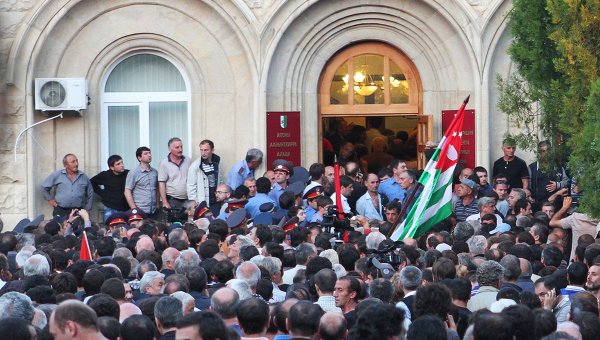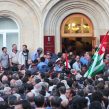
New Wave of Chaos Hits Russian-Occupied Abkhazia
Publication: Eurasia Daily Monitor Volume: 11 Issue: 106
By:

On June 1, Alexander Ankvab, the separatist president of Georgia’s breakaway region of Abkhazia, resigned. His first term was to expire in 2016. The Abkhazian parliament scheduled early presidential elections for August 24, 2014 (IA Regnum, June 1).
Ankvab’s resignation followed four days of chaos in the Russian-occupied region. On May 27, several thousand protesters, led by the anti-Ankvab Abkhazian opposition groups, twice stormed the building of the presidential administration. Finally the protesters, some of them armed with machine guns, broke in and captured the building as well as the public television channel. The opposition effectively took power in the capital Sukhumi. Ankvab fled to an undisclosed location, calling the events a “coup attempt” (Interfax, Civil Georgia, May 27–June 1).
Ankvab certainly is no stranger to the chaos and uncertainty in lawless Abkhazia. Since 2005, he survived six assassination attempts from rival clans (news.ge, February 22, 2012). This time, however, his challengers were not the clans, which repeatedly failed to hit their target. So who was after Ankvab this time? Was it truly the political opposition?
Today, Russia tightly controls every aspect of socioeconomic and political life in Abkhazia. Moscow’s political and military grip over the region particularly strengthened after the August 2008 Russian-Georgian war, when Russia completed the occupation of Abkhazia and unilaterally recognized it as an independent state. Consequently, it is a mistake to assume that any political development in Sukhumi or in any other provincial Abkhazian city, can take place entirely independently of Kremlin.
Publicly, Moscow quickly distanced itself from the current ongoing turmoil in the region, stating that Russia considered the recent events as an “exclusively internal affair of sovereign Abkhazia” (IA Regnum, May 29). Nevertheless, putting the facts and following events together, tells an opposite story.
As early as the second day of the outbreak of protests in Sukhumi, the Kremlin dispatched Vladislav Surkov, the Russian president’s special aide on Abkhazia and South Ossetia, in order to resolve the conflict on the ground (Apsnipress, May 28). And after several days of talks with Surkov, Ankvab finally felt compelled to resign.
The composition of the top leadership of the anti-Ankvab opposition is also telling. One of its key leaders is Raul Khajimba, a graduate of Belarus’s KGB academy in the mid-1980s, who served as a KGB officer. In fact, Khajimba was Moscow’s preferred presidential candidate in Abkhazia from as early as 2005. He served as the separatist region’s vice president in 2005–2009 (Civil Georgia, May 28). Over the years, Khajimba became well-known for his radically anti-Georgian stance (see kvirispalitra.ge, May 30).
The demands of the anti-Ankvab opposition are revealing as well. Its key demand was for Ankvab’s administration to immediately stop granting so-called “Abkhaz citizenship” to ethnic Georgians. These Georgians are part of the originally 350,000-strong Georgian population of Abkhazia who were subsequently ethnically cleansed, expelled or killed during the 1992–1993 Russian-sponsored separatist war in Abkhazia. Only about 30,000 of them were allowed to return and currently live in the eastern part of Abkhazia, in Gali district. The opposition said granting them “citizenship’ threatened “Abkhaz sovereignty,” as it increased the share of Georgians in the largely depopulated separatist region (Civil Georgia, May 28).
Furthermore, the opposition demanded closer ties with Russia and called for Abkhazia’s membership in the Russian-dominated Eurasian Union and Customs Union (IA Regnum, May 29). Moreover, the opposition attacked Ankvab for authoritarian rule, corruption and misappropriation of Russian aid money, which makes up 70 percent of the impoverished region’s budget (Civil Georgia, May 28, 29).
The ousted Abkhazian separatist president was neither anti-Russian, nor pro-Georgian. Nevertheless, Russia decided to let him go and will replace him with someone even more loyal, most likely with the above-mentioned Khajimba or some other trustworthy individual. Although Moscow is able to readily conceal any ongoing standoffs it has with the separatist regime in Sukhumi, most likely the Kremlin had disagreements with Ankvab over the allocation of Russian funds and of granting “Abkhaz citizenship” to ethnic Georgians in Gali district. Consequently, Moscow has not tolerated even the slightest deviation from Russia’s policy course in Abkhazia and removed Ankvab.
Ankvab’s ouster certainly leaves Moscow in a far stronger position in Abkhazia than it held just a couple weeks ago: Russia once again clearly showed who is fully in charge of the occupied region. If the separatists in Sukhumi still had any illusions of independence, such wishful thinking should have dissipated now. Indeed, the recent events suggest that the Russian Federation regions of Ural or Krasnodar may have more inner autonomy than occupied—but ostensibly independent—Abkhazia. Furthermore, Ankvab’s ouster clearly emphasizes that any future separatist leader in Abkhazia can share his fate if he does not fall completely in line with Moscow’s policies.
Another question is what will happen to those thousands of Georgians who live in Abkhazia under the conditions of daily discrimination by the Russian occupation forces and separatist militias alike. The Abkhazian opposition’s radically anti-Georgian rhetoric may soon transform into radical actions, which may force the expulsion of those living in Gali district. In the following weeks and months, the fate of those Georgians will become clearer.




